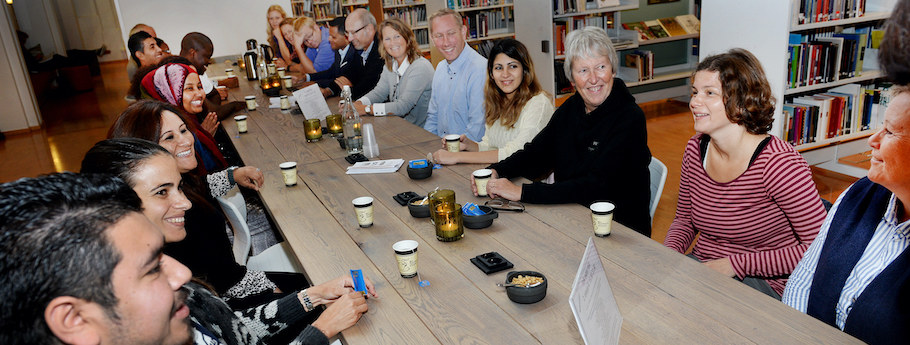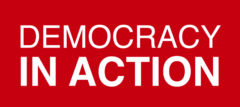
During a 2019 lecture in Kristiansand, Professor Hans Grelland described the experience of moving to a foreign country as the feeling of ‘standing undressed’. Leaving one culture for another puts our very personality and identity at stake. We are uniquely vulnerable. In particular, for many immigrants, settling in a new country involves having to embrace a new language as one’s own. As might be expected, this process of reinvention is no easy task – effectively, it involves acquiring an entirely new cultural lens.
With this in mind, this article spotlights a collaborative dialogue method called Folk Møter Folk, or People Meet People. The core idea driving the project is that if integration is to make the leap from policy aspiration to reality, people need to meet one another face-to-face and open their hearts. The result, as we shall see, is democracy building in practice.
The Arendal Adult Learning Centre
I am one of the founders of the People Meet People initiative, which was developed in 2015 for the Arendal Adult Learning Centre – where I work – in collaboration with the local network Med Hjerte For Arendal (“With a Heart for Arendal”) and Arendal Public Library. Arendal is a small city of approximately 45,000 people in southern Norway. In the 1990s, the city was known as a hotbed of far-right, anti-immigrant feeling. In response, the local community stepped up to tackle these attitudes, declaring Arendal an anti-racist zone.
Since then, the city has come a long way and today hosts Norway’s largest annual democracy week: Arendalsuka (“Arendal’s week”). The goal of Arendalsuka – co-created by national and local political parties, NGOs, universities, research institutions, private companies and the Municipality of Arendal – is to strengthen belief in political empowerment and democracy through open debate and participation.
At a basic level, the Arendal Adult Learning Centre provides Norwegian language courses for immigrants (mainly migrant workers and refugees) and primary school education to adults. In reality, the centre’s role extends far beyond this. In contributing its expertise to a variety of collaborative projects involving public, private and voluntary actors, the centre has been able to cultivate and share a wealth of ideas. These collaborative involvements are highly relevant to new national curricula for adult immigrants, which place great stress on democracy and citizenship.
Underlying all this is the belief that dialogue offers a fruitful pathway for achieving a common human future in a multicultural society. This conviction has driven the centre – and myself – to look for, cherish and attempt to create safe spaces where people can meet face-to-face regardless of cultural, religious or political divides.
Introducing People Meet People
People Meet People is a low-budget concept developed in response to immigrants and local people asking for tools to increase their contact with, understanding of, and knowledge about, each other. It involves collaboration between local libraries, voluntary organisations and language-learning centres.
The core of the project is strategically matching individual participants in pairs, who then meet for a 30-minute one-on-one chat. Following this, the wider group gathers in a safe space to share their experiences, thoughts and ideas. Good mapping of the participants in advance of the event is crucial.
In 2015, the first People Meet People event was organised in Arendal’s local library, where ten immigrants and ten people from the local community were introduced to each other. It proved to be a success beyond anything we could have envisaged. People laughed and cried as they shared stories from their private conversations with the wider group.
Later that year, People Meet People was awarded the prize for best idea in the field of integration in southern Norway by the Norwegian Directorate of Integration and Diversity. As the award letter acknowledged,“the idea is smart and has simplicity in its complexity; it recognises that most people actually want to meet, and have an inherent desire to meet”.
Freedom to be yourself
One of the most interesting things about People Meet People is how, as an event, it pushes those who participate to come forward – and exist – as themselves. It is only through the presence and actions of those involved that the content of the event is created. This creates both risk and unpredictability.
Essentially, you come and you participate. You don’t do this as a representative of a group or a community, but simply as yourself. To the extent that the meeting results in ongoing relationships, this is merely an expression of what the participants themselves have decided. From the point of view of the event, all that is required is for participants to come forward as subjects and dare to fill the conversation with content.
Keeping an open mind
No preparatory work is expected of the participants, and no obligations are placed on them after the meetings, which are always held during the day. Local participants book them as appointments, while students at Arendal Adult Learning Centre treat them as language lessons. In order to ensure participants enter the People Meet People space as open-minded as possible, they are given no information about the person they will be talking to.
While what happens in the wake of a meeting is not in the hands of the organisers, we have heard stories of job offers, parties, Christmas celebrations, hiking or just hanging out. Still, the most important experience is, I would argue, simply that of gathering round the table and engaging with people from a broader cultural pool that might have been the case beforehand.
The ultimate intention of People Meet People is to give individuals the chance to step out of the identity and political power relations that characterise their group affiliation. A woman I know who had to flee her homeland told me that the most difficult thing about being a refugee was being regarded as a representative of some homogenous group. Thus, including new people into groups and societies requires conscious choices – just as it requires awareness to make the choice to enter new constellations and groupings.
Democracy building in practice
People Meet People is a response to the potential marginalisation and abuse inherent to any written policy that defines an individual’s needs and obligations based on statistical and cultural assumptions. The hope is that these meetings expose participants to integration as an event involving themselves, rather than just as a political question concerning others.
After a meeting, one woman stated that “the meeting made me aware of the power of looking in the eyes of someone and listening to their voice”. Her comment inspired me to continue my work and believe that small events can play a decisive role in building strong multicultural communities.
Another statement I will not forget came from a young man who told me that “after People Meet People, I feel like an important person and a part of the local society”. This, perhaps more than anything else, is proof that People Meet People represents democracy building in practice, and that it has succeeded in allowing people to feel a little more ‘dressed’.
Hilde Mjøs is project manager of Folk Møter Folk.
The views expressed in this article are those of the author and do not necessarily reflect Democracy In Action’s editorial stance, or the position of any institution or association.
